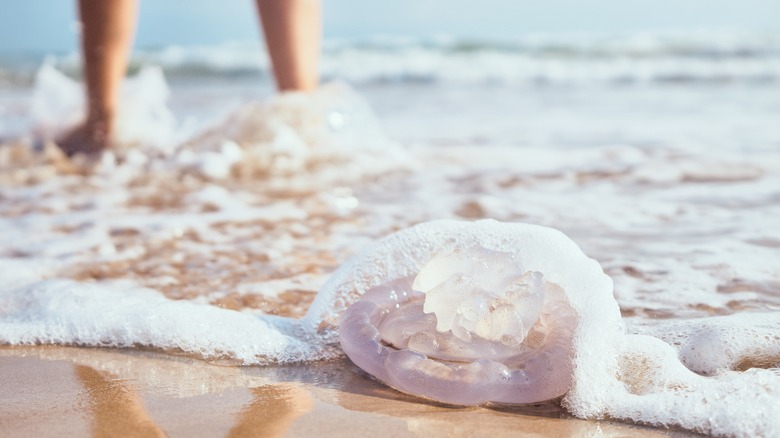Travel Guides Beach Vacations
Shelly Abramovich
Jellyfish are arguably the most graceful yet pesky residents of global waters. They’ve been around for over 500 million years, are made of 95% water, and are present in every ocean worldwide. Turtles, especially leatherback, eat jellyfish as a primary food source, and some Asian cultures enjoy dehydrated or pickled jellyfish as a culinary delicacy despite their poisonous reputation. But one thing everyone can agree on is that getting stung by one sucks. Here is how to avoid these gelatinous pests at the beach.
Although jellyfish lack brains, hearts, or many other internal systems, they still need to reproduce. This happens during jellyfish season. It varies by species and location, but generally, it begins in the springtime and peaks in the summer with blooms of thousands, if not millions, of jellies (a group of jellyfish is called a “smack”!). Once you know your beachside destination, research when this peak is happening and avoid it as a first line of defense.
Spotting a jellyfish might seem simple, but they can be surprisingly elusive due to their varied sizes, colors, and transparency levels. One of the primary identifiers of a jellyfish is its tentacles. Often transparent and wavy, they float ethereally under or on the surface of the water. However, these tentacles are not just beautiful appendages but also their primary weapon. Filled with venomous nematocysts, even a detached tentacle can deliver a nasty sting. If you notice something in the water that remotely resembles one — time to make a swift exit.
Beyond the obvious stingers

alagon/Shutterstock
It’s a mistake to assume all jellyfish look alike. There are over 2,000 species of jellyfish which range from the large, often colorful, bell-shaped species like the Sea Nettle (highest stinging offender in the U.S. Atlantic and Gulf coasts) to the smaller, transparent varieties such as the Moon Jelly. Jellyfish larvae, known as planulae, are particularly challenging as they’re minuscule and difficult to spot — and yes, they can sting. Don’t let your guard down just because you aren’t seeing large, obvious jellyfish nearby.
While the body or bell of a jellyfish might be easily visible, its tentacles can stretch out quite a distance, especially for species like the Portuguese man o’ war — with an average tentacle length of 30 feet, some extending up to 100 feet. For perspective, that’s the size of a Boeing 737-500. So, even if the main body seems a safe distance away, its tentacles might be closer than you think.
It is estimated that over 150 million people get stung by jellyfish every year. Taking precautions before entering the water is always a good idea. Today, several jellyfish repellents available in the market can protect against stings, including those from invisible larvae and tiny jellyfish. These lotions form a protective barrier and deceive the jellyfish into perceiving the swimmer as another jellyfish, preventing a reactionary sting. If you’re planning to swim in an area known for jellies, it’s probably a good idea to invest in a repellent — some even double as sunscreens!
Beachside vigilance against jellies

Opachevsky Irina/Shutterstock
To make matters worse, a jellyfish doesn’t need to be in the water to be a hazard. Washed-up jellyfish, even those that appear dead, can still sting. Dead jellyfish can often look innocuous, sometimes resembling everyday objects that wouldn’t typically be out of place on a beach. They might look like deflated balloons, plastic bags, or shells — so please mind your step. This camouflage can be especially dangerous for curious children or unsuspecting beachgoers.
Watch for warning signs indicating the presence of jellyfish in the waters. Many beaches with frequent jellyfish sightings will have cautionary signs or purple flags, which signify hazardous marine life in several countries. You can also inquire with the stationed lifeguard about any recent sightings. It’s worth noting that most jellyfish are relatively harmless to humans. A sting can cause burning, irritation, and itching, depending on the severity. However, some dangerous jellyfish can inflict severe harm or be fatal, which is rare. Even so, it is completely understandable why some people have scyphophobia, the fear of jellyfish, or cnidophobia, the fear of being stung by one.
By staying informed and vigilant, you can ensure that an unexpected encounter with a jellyfish doesn’t mar your beach-going experience. Always respect the sea and its inhabitants (even gelatinous ones); if in doubt, it’s always better to err on the side of caution. Whether splashing in the waves or building sandcastles, keeping a watchful eye for jellyfish can guarantee your beach time goes swimmingly and sting-free.

